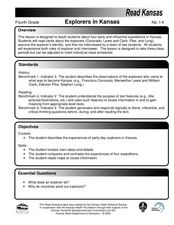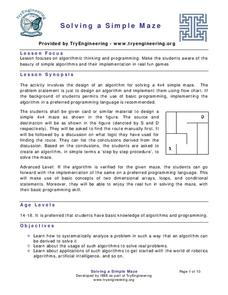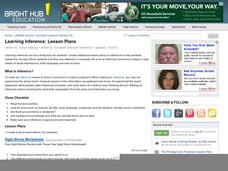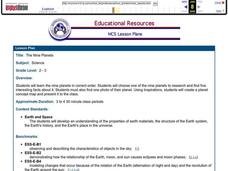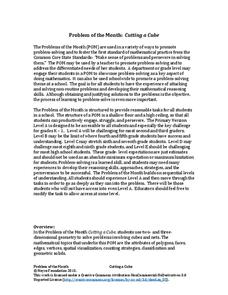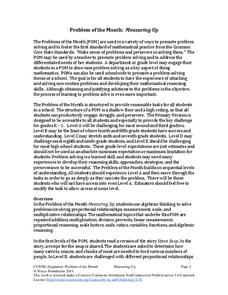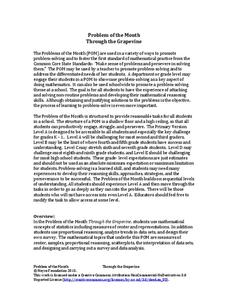Curated OER
Best lesson in the whole world!
Students study the concept of fraction using mathematical reasoning. In this problem solving fraction lesson, students use various methods to explain their reasoning in solving fractions. Students use a number of different prompts to...
Curated OER
Little Pigs with Big Problems
First graders solve one problem per day regarding the story of Three Little Pigs. In this math journals lesson plan, 1st graders solve problems on a daily basis using the story of the Three Little Pigs.
Curated OER
Teach Students a Range of Problem-Solving Strategies
Arming students with a multitude of strategies will help them meet their math challenges.
Curated OER
Explorers in Kansas
Fourth graders read cards about the explorers: Coronado, Lewis, and Clark, Pike, and Long. In this influential expeditions lesson, 4th graders describe and observe explorers who came to Kansas. Students locate main reasons and details as...
Learn NC
A Christmas Carol Chronology
Which comes first? The Ghost of Christmas Past, Present, or Future? What clues can readers use to establish the chronology of A Christmas Carol? The tale of Ebenezer Scrooge, Marley, and Tiny Tim provides the text for an activity that...
Illustrative Mathematics
Shortest Line Segment from a Point P to a Line L
One of the hardest skills for many young geometers to grasp is to move beyond just declaring obvious things true, and really returning to fundamental principles for proof. This brief exercise stretches those proving muscles as the class...
TryEngineering
Solving a Simple Maze
Solve a maze ... from a robot's point of view. In the lesson, your scholars build a small, simple maze from cardboard and then find a route from the start point to the finish point. They write an algorithmic process that a robot could...
Prestwick House
Writing Arguments in Response to Nonfiction
Emotional appeal or argument? That is the question. An informative lesson helps your class recognize the difference between a logical argument and an emotional appeal and learn how to craft an argumentative response. Writers develop a...
Noyce Foundation
Boxes
Teach your class to think outside the box. Scholars use the concept of equality to solve a problem in the assessment task. They determine how to use a scale to identify the one box out of a set of nine boxes that is heavier than the others.
Curated OER
Learning Inference
Making inferences can be a tricky proposition for middle schoolers. In the lesson presented here, pupils practice the skill of drawing a conclusion and making a judgment - which are what making an inference is all about! There are five...
Curated OER
Sentence Completion 7: High-Intermediate Level
Need another sentence completion worksheet? The great thing about this one is the extensive answer/explanation key that accompanies the exercise. The key pinpoints the clues, strategies, and logic used to determine the correct answer...
Noyce Foundation
The Wheel Shop
Teach solving for unknowns through a problem-solving approach. The grouping of five lessons progresses from finding an unknown through simple reasoning to solving simultaneous equations involving three and four variables. Each lesson...
Curated OER
The Nine Planets
A solid lesson on teaching the nine planets in our solar system is here for you. In it, young scientists learn the correct order of the planets, and they choose one of the planets to do a research report on. They must come up with five...
Spartan Guides
Infographics Lesson
An infographic is fantastic way for learners to illustrate their understanding of content, express themselves creatively, and teach others in a manner that is both engaging and informative. While originally designed for a lesson on...
Virginia Department of Education
Sound
Add a little music to your next physics class. Pupils discuss how frequency determines pitch and take part in several activities designed to teach them more about sound, melody, resonance, and vibrations. They use materials to construct...
Noyce Foundation
Cutting a Cube
Teach the ins and outs of the cube! A series of five K–12 level activities explore the make-up of the cube. The beginning lessons focus on the vocabulary related to the cube. Later lessons explore the possible nets that describe a cube....
Noyce Foundation
Measuring Up
Teach the basics of measurement and conversion with a five-lesson resource that builds an understanding of proportion and measurement conversion from elementary through high school. Initially, young scholars use ratios to determine soup...
Noyce Foundation
Through the Grapevine
Teach statistics by analyzing raisins. A thorough activity provides lesson resources for five levels to include all grades. Younger pupils work on counting and estimation, mid-level learners build on their understanding of the measures...
Think Like A Programmer! Puzzlets Cork the Volcano Curriculum
Common Core Standards Connected
The standards listed below are standards from the Common Core Framework which map to learning opportunities with Cork The Volcano & Puzzlets.
Source Link: http://www.corestandards.org/
Grade...
Curated OER
The Economic Way of Thinking - About Everything
Students write their definitions of economics on index cards and revise them as the lesson plan continues. They discuss the principles of economic reasoning and after completing a quiz, use economic reasoning to solve "real life" mysteries.
Alabama Learning Exchange
Fun with Problem Solving
Using a varity of strategies, young mathematicians solve multistep word problems. They play a logic game as a whole group, and then work with a partner on a computer to complete a worksheet that requires a variety of problem solving...
Curated OER
Square Pegs in Round Holes
Sixth graders problem solve the square peg in the round whole problem by applying knowledge of the formulas for the areas of the circle and the square. They decide on a problem solving strategy based on logical reasoning.
Curated OER
Robots
Fourth graders devise and use problem solving strategies to explore situations mathematically (guess and check, make a drawing, use equipment). The use of logical reasoning is a focus of this lesson.
Curated OER
Using "Why Mosquitoes Buzz in People's Ears" to Teach Cause and Effect
Students discuss cause and effect relationships and the chain reaction involved before listening to the story "Why Mosquitoes Buzz in People's Ears". Students create flow charts to show the chain reactions of causes and effects in the...





